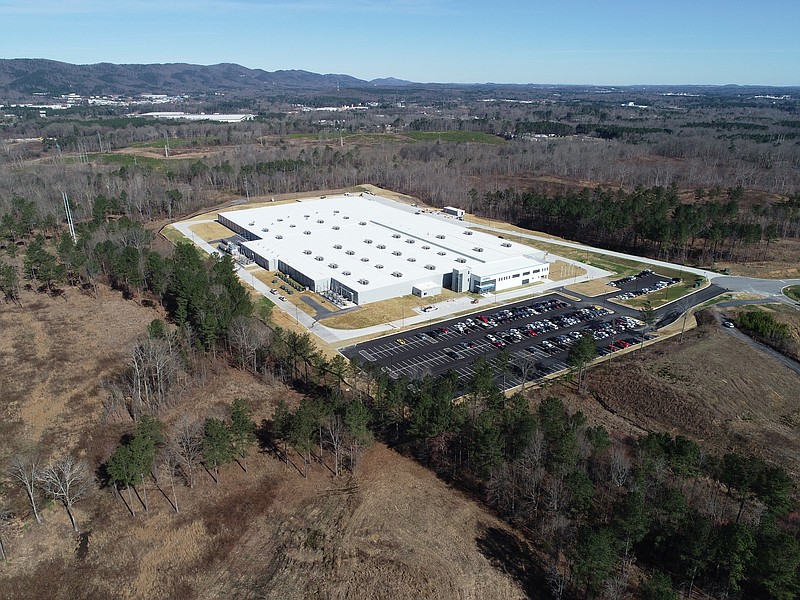DALTON, Georgia - In a city built on making carpets and floor covering, a Korean manufacturer has added what its officials say is a more sustainable factory making rooftop solar panels and other modules for utility-solar power generation.
Hanwha Q Cells USA marked the completion Friday of the largest solar module manufacturing plant in North America, which will produce enough solar panels to generate as much peak power as the Hoover Dam every year.
The company's initial plans for a $150 million plant with 500 employees grew since its announcement last year into a nearly $200 million investment with 650 employees.
Georgia Gov. Brian Kemp, who met with Hanwha Q Cells CEO Charles Kim in his first foreign trade mission as governor in June, said the Korean investment here is one of 13 announced foreign direct investments this year in Georgia from Korea - more than any other country.
"This is a fantastic technology in an emerging industry and it's great to see this type of manufacturing come to Georgia," Kemp said after touring the Hanwha Q cells plant. "This is not only great for the people employed here but it will also helps our farmers who are putting up solar farms all over our state."
(Read more: Korean solar panel maker hiring more workers at its factory in Dalton, Georgia)
Located in the Carbondale Industrial Park, Hanwha built its first U.S. facility in only seven months and began production in January. The facility is the largest of its kind in the Western Hemisphere with an annual module production capacity of 1.7 gigawatts and is designed to serve the U.S. solar market.
Company at a glance
Name: Hanwha Q CellsHeadquarters: Seoul, South KoreaFounded: 2012Local operation: A $200 million production plant in the Carbondale Industrial Park in Dalton, GeorgiaProducts: Photovoltaic cells, solar modules, solar systems and large-scale solar power plantsStaff: 8,500 around the globe, including 650 in Dalton
The United States is second only to China as a market for new solar power generation. John Smirnow, president of market strategy for the Solar Energy Industries Association (SEIA), said Hanwha Q Cells is a leader in the growing industry, which SEIA hopes will grow to produce 20% of America's electric power by 2030.
Solar power generates about 2.3% of all electricity for homes and utilities in America, but solar is gaining favor as its costs decline and a growing number of companies like Facebook, Amazon and others commit to buying only renewable power.
SEIA and other solar industry groups complained when the Trump administration last year imposed duties of as much as 30% on solar equipment made abroad, which provided about 80% of the solar panels used in the then $28 billion U.S. market. Solar installers said the higher costs for solar panels due to the import duties weakened some of the cost advantages for installing solar panels.
But during Friday's grand opening ceremonies for the Hanwha Q Cells plant, a top Trump trade negotiator said the tariffs have helped encourage foreign solar producers to build in the United States.
"When President Trump announced the solar panel duties in 2018, there were many who feared that the solar power industry would decline in the United States," said Jeffrey Kessler, the assistant secretary for enforcement and compliance in the U.S. Department of Commerce. "In fact, just the opposite has happened. Solar power is booming and solar manufacturing facilities are sprouting up around the country."
Nonetheless, Hanwha Q CELLS is still embroiled in trade and patent disputes with competitors over its proprietary Q.ANTUM technology, which helps boost power output from its solar panels. The Korean company filed complaints in March with the International Trade Commission, claiming two rival solar manufacturers from China and another from Norway were illegally using Hanwha's passivation technology on their equipment. The commission agreed in April to investigate the complaints.
"We think intellectual property protection is extremely important," said Scott Moskowitz, director of strategy and market intelligence for Hanwha Q Cells. "It protects companies like ours with hard-earned technology, and we take this very seriously and look for a favorable ruling, probably next year."
Moskowitz said Hanwha "did not ask for the solar tariff, but we responded to them" by building the Dalton plant to get better access to the U.S. market. Although production costs are generally higher in the United States than in Hanwha's home country in South Korea, Moskowitz said the Dalton plant helps the company provide quicker and more specialized service.
Lisa Nash, the factory human resources manager here, said most production workers at the new Dalton plant re being paid from $14.50 to $19 an hour and are being trained to learn about the new technology.
In a manufacturing city hard hit by the decline that hit the carpet industry a decade ago, Nash said the new solar panel plant "offers a new hope for Dalton."
Contact Dave Flessner at dflessner@timesfreepress.com or at 757-6340.

